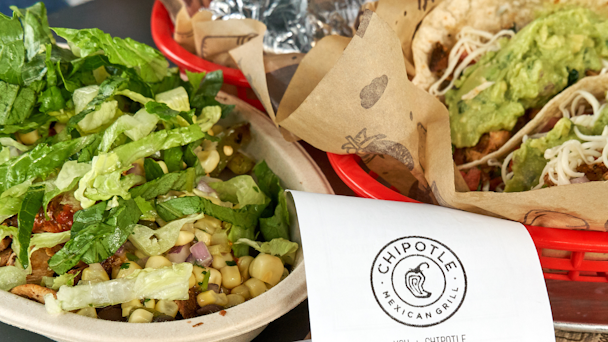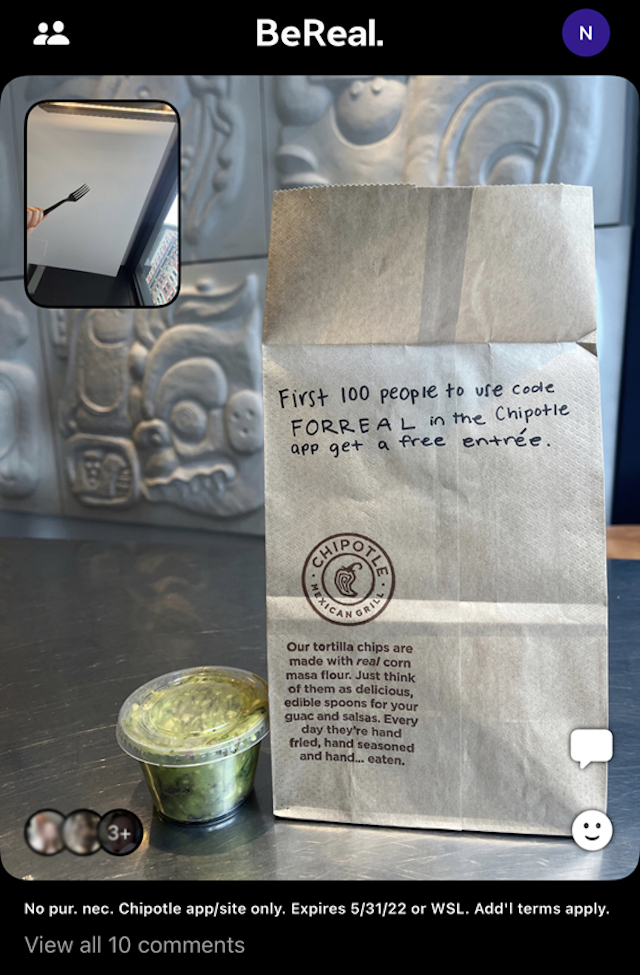Chipotle gets candid with the anti-filter social media app BeReal
Fast-casual Mexican chain Chipotle is one of a growing number of brands joining BeReal, a new anti-filter, anti-influencer social media platform designed to promote authenticity online. Though the app doesn’t offer pay-to-play advertising options, Chipotle and others are finding unique ways to promote their brand and capture user attention – by leaning into the platform’s ethos of transparency.

Chipotle says it wants to stay transparent and authentic in promoting its fresh ingredients / Adobe Stock
Unfiltered and candid? That’s right up Chipotle’s alley. That’s why the popular Mexican grill – which has a penchant for early adoption of new platforms – has joined BeReal.
With no filters, edits, curation or even likes, BeReal is promising a different kind of social media experience. Every day at a random, unknown time, all users receive the same notification inviting them to snap a picture of what they’re doing. Users only have two minutes to open the app and take a photo – and they can only see what their friends post if they post within the allotted time. It’s a unique mash-up of Snapchat and gen Z’s ‘casual Instagram’ – with randomness and chance thrown into the mix.
To tap into this growing community, Chipotle shared a limited-offer reusable promo code on its BeReal posts earlier this month. For four days, the first 100 consumers to use the code online or on the restaurant’s app scored a free entrée. The campaign represented one of the first brand marketing activations on the new social media platform.

Originally launched in 2020 by GoPro alum Alexis Barreyat, the app didn’t gain much traction globally until earlier this year. Following a $30m capital funding round led by Andreessen Horowitz and Accel last year, the company invested in a paid ambassador program focused on building awareness on college campuses. The initiative helped to increase downloads significantly, primarily among gen Zers and college students.
Now the platform has over 2.9 million daily active users. It’s seen a 315% leap in downloads since the start of 2022, per recent data from trendwatching site Social Media Today.
“We see a massive opportunity to highlight our brand’s transparency in fun ways for our fans on BeReal,” says Tressie Lieberman, the company’s vice-president of digital marketing and off-premise.
Brand fit matters in an unfiltered world
In line with its commitment to barring filters, edits and influencer culture, BeReal doesn’t have advertising. In the absence of paid social ads, a brand might normally turn to sponsorships and influencer marketing; but those opportunities are slim to none on BeReal. It would appear as though the app is trying to deter any explicit marketing.
But that doesn’t mean that brands can’t get involved and even thrive on the app. “There’s an opportunity for brands to add value on BeReal, but I would caution brands to really think introspectively about what they’re trying to get out of that,” says Teresa Day, president of Planoly, a social content planning and scheduling tool.
She also stresses that brands shouldn’t rush to get on the platform just to grab at eyeballs; she advises all brands to consider whether they will be able to genuinely connect with target audiences on a platform such as BeReal. Not every brand will be a fit. “Being on BeReal, which is so centered on authenticity, it would behoove the brand to ... think about the audience that they’re trying to reach and if that’s the audience that resonates with their brand. Then, if they have an authentic story to share, lean into that a little bit more and try not to get tempted by the desire to tell a polished story or stay totally on-brand all the time.”
For brands that do see a good fit on BeReal, she suggests that behind-the-scenes content – like that Chipotle is aiming to provide – is often received well. She also points out that “personifying your brand” in playful ways – in a similar vein to what Duolingo, Taco Bell and, yes, Chipotle, are doing on TikTok – “gives [audiences] a reason to interact with you and believe in you.” This tactic may prove especially effective among younger audiences who increasingly demand humanization, humor and honesty from brands.
Chipotle, for one, is excited for the possibilities. Lieberman says the brand identifies with the platform’s focus on promoting raw, authentic content, as it wants to be transparent about its ingredients and business operations. Like other users on the platform, Chipotle only has one opportunity a day to showcase a real moment – it’s taking these chances to give fans a closer look at real products and operations. “With BeReal’s focus on authenticity, we are discussing how we can leverage the platform to give fans behind-the-scenes access to our kitchens and the culinary techniques used to make our real food,” says Lieberman.
Brands beware
Some experts, however, are skeptical of brands joining BeReal in any capacity. Brady Donnelly, managing director of Sela, a marketing agency for beauty brands, worries that too many will sign on with the intention of loopholing the system and posting curated ad-like content. “I would advise brands to stay off the platform until they can determine the risk of countering the authentic design of the network is worth the upside of reaching the users,” he says.
He’s also skeptical that some form of influencer marketing won’t take hold on the app. “If [brands] do feel the need [to join BeReal], it’s relatively obvious that we’ll end up with the same influencer strategy we’ll see elsewhere, albeit perhaps in a more nuanced, subtle way. I don’t think the value is there yet though – [there is] not enough of a user base to try to invade what is purported to be a safe, authentic space for users.”
Karen Freberg, a social media expert and professor of strategic communication at the University of Louisville, is more optimistic. “There is a demand for apps like BeReal because of the growing need for authenticity. We have seen the dominance of filters, editing apps and picture-perfect images and videos shape the social media industry. As a result, this has increased unrealistic expectations and pressures from various audiences, especially for gen Zers and millennials. Everyone wants to see what is really going on – without the filters, edits and changes.”
Still, she warns against diving into a new space just for the sake of it – without a well-planned strategy to deliver real value to users. “Gen Z and other audiences can smell an ad from a mile away.”

